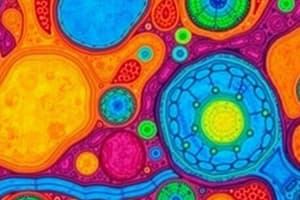Podcast
Questions and Answers
In multi-cellular organisms, most cells are specialized to __________.
In multi-cellular organisms, most cells are specialized to __________.
- be identical to each other
- carry out specific functions (correct)
- reproduce rapidly
- form unicellular organisms
How do muscle cells in human beings contribute to movement?
How do muscle cells in human beings contribute to movement?
- Produce hormones
- Contract and relax (correct)
- Conduct food and water
- Carry messages
What is a cluster of cells carrying out a particular function at a definite place in the body called?
What is a cluster of cells carrying out a particular function at a definite place in the body called?
- Unicellular cell
- Organism
- Protein
- Tissue (correct)
Which of the following is NOT an example of a tissue?
Which of the following is NOT an example of a tissue?
Which statement best describes the concept of division of labour in multi-cellular organisms?
Which statement best describes the concept of division of labour in multi-cellular organisms?
Why are most cells in multi-cellular organisms specialized to carry out specific functions?
Why are most cells in multi-cellular organisms specialized to carry out specific functions?
What is a characteristic difference between plants and animals based on the given text?
What is a characteristic difference between plants and animals based on the given text?
Why do plants have large quantities of supportive tissue, as mentioned in the text?
Why do plants have large quantities of supportive tissue, as mentioned in the text?
What is a key difference between cell growth in animals and plants?
What is a key difference between cell growth in animals and plants?
What type of tissue is responsible for the growth of plants only in specific regions?
What type of tissue is responsible for the growth of plants only in specific regions?
How are new cells produced by meristematic tissues initially described?
How are new cells produced by meristematic tissues initially described?
Why do complex animals have a more specialised organ system design compared to complex plants?
Why do complex animals have a more specialised organ system design compared to complex plants?
Flashcards are hidden until you start studying




